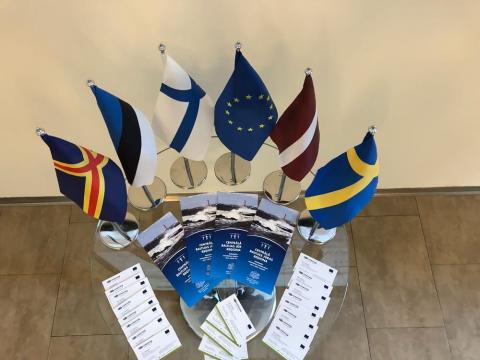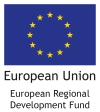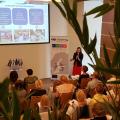In Riga - CB project partners shared their experiences with potential 4th call applicants
Friday, August 17, 2018 - 18:14
An information session outlining the features and criteria of the fourth call of the Central Baltic Programme took place in Riga on 14 August. There were fifty or more potential applicants in attendance, long-term cooperation partners as well as many new faces, representing the planning regions, municipalities, universities, the Latvian Chamber of Commerce and the Industry and Employers’ Confederation of Latvia.
There were inspirational presentations from two of the projects, with equal emphasis on encouraging applicants and reminding them how much work is required at every phase.
“This project gives us the opportunity to see ourselves from a different angle, to understand how people from other countries see us, and to implement the necessary improvements accordingly”, said Asnāte Ziemele of the Latvia Rural Tourism Association. She manages the project “CAITO”, the aim of which is to attract Japanese visitors into rural tourism opportunities in Latvia, Estonia, and Finland by exploring the Japanese tourism market.
Ms. Ziemele also highlighted the importance of investing heavily in the preparation phase of a project. This, she claims, is crucial for success, and pays off 200% during the implementation phase.
CAITO is a good example of how a project can impact beyond its direct activities. It has recently been attracting considerable media attention for its research on how easy (or difficult) it is for foreign tourists is to travel around Latvia (especially rural areas) by public transport.
Nika Kotoviča gave a presentation on the “iWater” project, aimed at developing integrated multifunctional stormwater management in the cities of the Central Baltic region.
Ms. Kotoviča identified equal, balanced involvement of all project partners in preparing the application and clearly defined areas of responsibility as the keys to success. As a Lead Partner in the “iWater” project, Riga Municipal Council City Development Department also offered valuable tips on how to acquire EUSBSR “flagship” status – the quality mark that gives a project wider recognition and visibility and contributes to the implementation of the EU Strategy for the Baltic Sea Region. Flagship projects serve as pilot schemes for action in their respective fields.
We encourage potential project partners to participate in the next step of this process, the Project Applicant Seminar in Tallinn on 28 August. Only the best ideas contributing to the development of the Central Baltic Programme will be supported. We wish everyone the best of luck!
There were inspirational presentations from two of the projects, with equal emphasis on encouraging applicants and reminding them how much work is required at every phase.
“This project gives us the opportunity to see ourselves from a different angle, to understand how people from other countries see us, and to implement the necessary improvements accordingly”, said Asnāte Ziemele of the Latvia Rural Tourism Association. She manages the project “CAITO”, the aim of which is to attract Japanese visitors into rural tourism opportunities in Latvia, Estonia, and Finland by exploring the Japanese tourism market.
Ms. Ziemele also highlighted the importance of investing heavily in the preparation phase of a project. This, she claims, is crucial for success, and pays off 200% during the implementation phase.
CAITO is a good example of how a project can impact beyond its direct activities. It has recently been attracting considerable media attention for its research on how easy (or difficult) it is for foreign tourists is to travel around Latvia (especially rural areas) by public transport.
Nika Kotoviča gave a presentation on the “iWater” project, aimed at developing integrated multifunctional stormwater management in the cities of the Central Baltic region.
Ms. Kotoviča identified equal, balanced involvement of all project partners in preparing the application and clearly defined areas of responsibility as the keys to success. As a Lead Partner in the “iWater” project, Riga Municipal Council City Development Department also offered valuable tips on how to acquire EUSBSR “flagship” status – the quality mark that gives a project wider recognition and visibility and contributes to the implementation of the EU Strategy for the Baltic Sea Region. Flagship projects serve as pilot schemes for action in their respective fields.
We encourage potential project partners to participate in the next step of this process, the Project Applicant Seminar in Tallinn on 28 August. Only the best ideas contributing to the development of the Central Baltic Programme will be supported. We wish everyone the best of luck!

The programme flags. Photo: Ilze Legzdina



